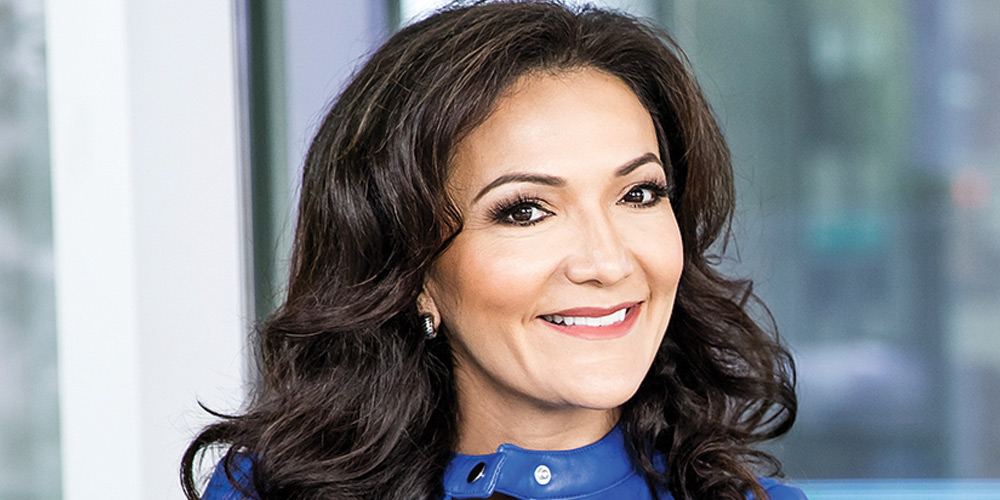Diversifying the high-tech talent pool
Pinnacle Group CEO Nina Vaca’s top priorities are to keep growing fast and expand the talent pipeline.
This interview is part of the Inside the Mind of the CxO series, which explores a wide range of critical decisions faced by chief executives around the world.
As a young entrepreneur, Nina Vaca was never one to turn down a rubber-chicken dinner — as long as it was for a good cause. The founder, chair, and CEO of the Dallas-based workforce solutions provider Pinnacle Group used to finagle as many invitations as she could to listen to keynote speeches by the best business and leadership minds. One particular luncheon in 2001, however, stands out. An elegantly coiffed Latina woman, dressed impeccably in a black St. John suit, walked up to the podium. She was Rosario Marin, the United States treasurer appointed by the George W. Bush administration. It was the first time Vaca had seen someone who looked like her in a position of such influence.
“She made me feel empowered; she made me feel like I could do it,” recalls Vaca, who was born in Ecuador somewhat unexpectedly when her mother had returned to visit family. (Vaca was raised in Los Angeles.) “All of a sudden I had this fire in my belly.” It was an epiphany waiting to happen: She had always believed a Latina woman could succeed. Vaca’s conviction was inherited from her mother, a civic activist, and her father, an entrepreneur who was murdered at his travel agency in a robbery of the valuable ticket-printing plates used before automated ticketing was introduced. It was left to Vaca, who was 17 at the time, and her sister to run his business and prepare it for sale. To this day, she believes the tragedy might have been avoided if the latest technology had been accessible to small business owners.
After graduating from college, Vaca landed a job in New York City at an IT services company and immediately saw her entrepreneurial future. Since founding Pinnacle from her living room in 1996, when she was 25, she has propelled the business from a niche IT services firm to a workforce solutions powerhouse, providing high-end services to global brands such as Comcast, AT&T, and MetLife. Along the way, she has championed diversity and the teaching of STEM (science, technology, engineering, and math) to girls and women. Nearly two-thirds of Pinnacle’s headquarters staff are women and almost half are minorities.
In 2018, Pinnacle Group was named the fastest-growing women-owned/-led company in the country (for the second time) by the Women Presidents’ Organization (pdf). It has been included on the Inc. 5000 list of fastest-growing companies for 13 years; Vaca also was chosen by the Obama administration as a presidential ambassador for global entrepreneurship (PAGE). In March 2019, she joined the Council on Foreign Relations, a U.S. think tank specializing in foreign policy and international relations.
Strategy+business recently sat down with Vaca at her headquarters to learn more about her business philosophy and why she has intentionally put diversity at the heart of her business.
S+B: As a member of the Hispanic community and a woman, you are something of a rarity in the technology industry. What drew you to this field?
VACA: My parents were the classic American immigrant story. To make ends meet and support his five children, my father worked a wide variety of jobs before opening his own travel agency. It was there that, at 15 years old, I saw my first computer. Back then, almost everything in the travel industry was manual — even down to the handwritten airline tickets. I remember using the Yellow Pages to try to call the airlines, which of course would then leave me sitting on hold forever. So, when I saw how a computer could save hours of work, I was hooked. It was my first “aha” moment about the power of technology.
S+B: What attracted you to talent acquisition?
VACA: Very few people go to college with the goal of running an IT workforce management firm. You come into this industry by accident, but you stay by choice, because it’s fascinating. It was being at the right place at the right time combined with curiosity and entrepreneurship — and seeing a gap in the marketplace and meeting it with a lot of hard work and just the right amount of luck.
S+B: Would you say there’s a major talent crisis in the U.S. now?
VACA: The so-called war for talent has been ongoing for decades. Today, we often speak about it in terms of the record low unemployment numbers, but the reality is that top talent has been scarce for generations. In the IT sector, [unemployment] usually hovers around 2 percent, and many other professional sectors see similarly low rates. So, the ability to find, and most importantly, retain top talent is an issue for every one of our clients, as well as for Pinnacle itself.
S+B: Is that why you are so involved in STEM education?
VACA: My involvement with advancing STEM has been a lifelong journey. I could see clearly that there was a gap, as I have been in the IT industry for 23 years, providing technology to some of the largest and fastest-growing companies. I know how powerful the technology industry has been for me personally and everyone at Pinnacle, and I have that keen eye for women and minorities in this space. So I started doing advocacy work for STEM education and career placement for women and minorities.
I have taken a very intentional approach toward creating a pipeline for more women and minorities in STEM. One of the ways is by partnering with the Dallas Independent School District and Dallas County Community College District on the Pathways to Technology Early College High School [P-TECH] program. The P-TECH program offers historically underserved students an opportunity to graduate in four years with a high school diploma and an associate’s degree. Many of these mostly minority students are first-time college hopefuls who will be workforce-ready with internships at companies like AT&T and Capital One. It helps address the gap in STEM career opportunities for women and minorities.
People around the country are hoping to replicate this in their markets. One of the things I’ve learned in life is that if you want to do something big, you have to start local.
S+B: Starting out, did you bump up against any obstacles as a Latina woman?
VACA: Entrepreneurs always find a way. I’ve never considered being a woman or a Latina to be an obstacle. In fact, I usually consider it to be quite an asset, in part due to the incredible entrepreneurial culture of the Hispanic community in general and my family in particular.
One of the things I’ve learned in life is that if you want to do something big, you have to start local.”
There are so many challenges to starting your own business at 25 years old, including insufficient access to affordable capital, top talent, and customers. These obstacles can be overcome only through consistent growth; that in turn can be accomplished only by consistently reinvesting back into Pinnacle. In many ways, everything we have achieved has only been made possible by the simple philosophy of investing back into the business, which is a message I share with other entrepreneurs every chance I get.
Of course, I can’t deny there have been circumstances in which there has been some unconscious bias [against me]. But I’ve learned how to take those obstacles and turn them into opportunities.
S+B: What have been some of the biggest transformations in your industry over the past two decades?
VACA: Our industry continues to evolve rapidly based on the adoption of ever more powerful and disruptive technologies. Years ago, it was Internet searches and job boards. After that came the enterprise technologies and accompanying service-level requirements. The newest phase of this technological revolution involves social media, artificial intelligence, robotics, and other algorithms that further disintermediate the role of traditional talent acquisition. And in the future, there will be even newer technologies — perhaps incorporating multiple elements of what today we refer to as “total talent management” [managing permanent and nonpermanent workers, including robots, with a view to the value of the worker rather than the employment status].
The successful firms — Pinnacle included — have embraced these technologies and adapted their business models and service offerings accordingly. Others have chosen to sell, resulting in our industry consolidating somewhat over the years. No matter what, the one thing we will always be able to count on is change, so we’re making the investments today to be ready for tomorrow.
As with most industries, margins get tighter over time, so you constantly need to be able to provide more for less and handle larger business volumes, all while making few mistakes. That’s taken a lot of players out of the game, leading to some consolidation in our industry. [At Pinnacle,] we’ve always had a long-term vision of being a leader in our space. But we knew that would happen only if we reinvested, put our people first, and delayed our own gratification.
S+B: Would you say mentorship is part of your corporate culture?
VACA: It has to be. We’ve grown so fast that if you’re not mentoring someone to take over your job, then you’re not succeeding. In a high-growth company, there’s always another job waiting for you. Our most successful people have been those who have continuously hired, trained, and promoted other strong people. We are proud to have women and men who are responsible for client relationships and business functions that are larger than they ever dreamed of at their age. Around here we say, “grow leadership” versus “grow yourself.” It’s absolutely my conviction.
S+B: How do you scale diversity as you grow? How do you keep it from being more of a quota-filling exercise?
VACA: It has to come from the top down. The tone has to be set by leadership, which is exactly why Pinnacle is the way it is. Our corporate headquarters is [approximately] two-thirds women, including many of our top producers and executives. It’s never been about a quota, it’s simply what happens when you’re performance-based.
The other comment I would make about diversity — especially for firms that may not have a history of it and that may be trying to catch up to their peers — is that you have to be intentional about it. Intentionality doesn’t mean a quota system, though. It means literally thinking about diversity as one of many characteristics, including talent, experience, and education, that make the company stronger and better-performing.
The companies where diversity thrives most are those where the CEO takes it seriously. And being serious typically involves a three-pronged strategy: employee diversity, supplier diversity, and board diversity. A common mistake is to miss one or more of those. For example, companies that are trying to attract minority consumers should be equally focused on utilizing minority suppliers.
Think about another statistic: Women now make 85 percent of the purchasing decisions in their households. So we’re starting to see a phenomenon of having more women in the C-suite, more women at the board level, and more women as suppliers, particularly among technology companies.
S+B: What do you say to the executives who complain they can’t find diverse candidates?
VACA: My biggest question is, “Are you being intentional?” It’s that simple. “Are you fishing in the right ponds? Are you aligning with the right groups? Are you aligning with the right nonprofits that specialize in and focus on diversity?” When people tell me they can’t find diverse suppliers, I tell them about the Women’s Business Enterprise National Council and the National Minority Supplier Development Council. If you simply drop into their ecosystem, you’ll find diverse suppliers who run global billion-dollar companies.
S+B: When you step back, what do you see as some of the major challenges coming downstream for businesses? Is it overregulation, the tax burden, the speed of technological change?
VACA: All of the items you mentioned, and many more, are ever-present threats for all businesses. In the specific example of our industry, an important one I would add to the list would be cybersecurity. Every day, our industry deals with millions of individual employees and their personal information. And a given individual might work for multiple firms during a single calendar year. Thus, we are a big target for phishing and other scams to try to get at that data. To combat this threat, we’re investing a lot of money in making sure that we have the infrastructure, the firewalls, and the procedures to protect that data for our employees and clients.
S+B: How are you using the avalanche of data available to help you forecast the future?
VACA: We’re obsessed with data and analytics. And for us it’s no longer a challenge of not having enough information. It’s about deciding what information is most relevant and most predictive. We have almost an unlimited amount of data at our fingertips, so we mine, analyze, and develop predictive analytics related to that data to help us make more accurate forecasts.
S+B: That data can also be quite siloed, coming from multiple sources. How do you connect the dots?
VACA: That’s an important point and a great question that we address every day. Which are the most important elements of our data, how do you interpret it correctly, and how do we use it to help solve problems for our customers? We are getting better at it than we were a decade ago because we’re intentional about it. Quite frankly, it’s what differentiates us from our competitors and brings value to our customers. We’re going to continue to dominate that section of our business.
S+B: What’s the immediate impact of AI on your business?
VACA: Some people are afraid of it because it’s an unknown, but AI is something that we have embraced. It can add a tremendous amount of value to almost every business out there, but it’s how we approach it that’s meaningful. We have already started a robotics pilot related to some of our internal functions. It’s all in how you communicate its value to your team, though. For us, it’s been an opportunity to give associates a different role. We let them know: “You’re still impacting the company, and you still have a place here, but all the mundane things that you hate doing, AI is going to be helpful with those.”
S+B: What would be a job the robot does here that others would be happy to have taken off their hands?
VACA: Essentially anything that’s repetitive, like data entry, forms processing, and certain standardized communications, along with issues that require 24/7 availability. As we become a more global firm, 24/7 availability will only become more relevant.
S+B: What advice would you give women who are at the top of the ladder?
VACA: I often tell other women: “Don’t beat yourself up. Somebody else will gladly do that for you.” We need to be confident in our abilities and how much we give, while trying not to lose ourselves along the way. Recently, I watched a speech from Marne Levine, then COO of Instagram. She said there is no difference between work and life. It’s all mashed into one these days. I agree with that, and I think you tend to inspire others when they realize that you’re human, too. They want to see your full, genuine self. That’s why I encourage Pinnacle associates to bring their whole selves to work. It’s part of our secret sauce.
Author profile:
- Samantha Marshall is a journalist and best-selling book collaborator based in in the United States.




